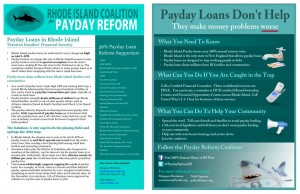 I’m an atheist. Let’s put that aside right away. I’m an atheist for very personal reasons, and it’s a decision I arrived at after very careful thought and much emotional difficulty. And I understand that this distinction sets me apart from a large majority of my peers and indeed the rest of Americans. To say that life is difficult for an atheist is an understatement, we can see the proof of this today with Jessica Ahlquist in Rhode Island. And as we put a close to this chapter in our history I want to make a call for unity going forward.
I’m an atheist. Let’s put that aside right away. I’m an atheist for very personal reasons, and it’s a decision I arrived at after very careful thought and much emotional difficulty. And I understand that this distinction sets me apart from a large majority of my peers and indeed the rest of Americans. To say that life is difficult for an atheist is an understatement, we can see the proof of this today with Jessica Ahlquist in Rhode Island. And as we put a close to this chapter in our history I want to make a call for unity going forward.
Plenty of religious leaders have already made the call for civility from their congregations after the horrific response from people as a result of the court decision. No doubt these folks who put out such an outpouring of hate considered themselves good Christian people, but I hope the aftermath of that hatred made them question that. Christianity is based far more on the New Testament than the Old Testament, and as such is far less violent and more martyr-based. The God of the Old Testament is a violent, jealous God. The God of the New is a loving, forgiving God. In this sense, it might be good to ask, are those who are quick to lash out when they feel their beliefs are under attack followers of Elijah or followers of Jesus?
That said, I do take issue with many atheists. Take for example, Rick Perry’s “Strong” advertisement. It was awful. It still is awful. It never should have aired, and it sort of signaled the end of Rick Perry as a viable candidate for President (if he ever had been). But one of the things that struck me was the angle that some of the inevitable parodies chose to take. The worst “parody” was almost as bad as “Strong” itself. Go ahead and watch it. Personally, I find it unwatchable. In every way, it’s just as bad as what it mocks. It makes me ashamed.
The best parodies, in my opinion, tapped into the shame religious folks felt watching Perry proceed to make an ass out of Christianity (my personal favorite). The best put Perry out there as something most people aren’t like. They didn’t dwell on religion, and instead relied on an exaggeration of Perry’s own words to make a fool of him. There wasn’t a sense of superiority. Too many atheists I run across have a sense of superiority combined with a unwillingness to listen. I understand, religious issues force visceral reactions; it’s why the religious right relies on them heavily. And I understand that there are religious folks just as superior and unable to listen (“Bill, you’re such a good person, it’s a real shame you’re going to hell”). The main difference is that atheists aren’t backed by large community organizations like churches. They exist in the minority and on the fringe.
Despite the case of Cranston, Rhode Island is still one of the least religious states; 79% of Rhode Islanders/Connecticuters are absolutely or fairly certain in a God or Universal Spirit, according to Pew Research’s most recent poll on the subject (their sample size required them to combine Rhode Island and Connecticut, there’s a 5% margin of error). Anyone reading that sentence has pretty much understood the issue here; agnostics and atheists are in the minority, by a long way. As I said, being an atheist is no walk in the park. Much of American life is still organized around churches and religious centers.
The secular left cannot afford to be ignorant of this. It cannot pretend to live in a non-religious America. A secular society is a tolerant society, not an atheistic one. There is a well-established precedent that there is a wall of separation between church and state, and this is good. Religion gets corrupted by politics as it has been many times over. The first argument for a secular America should be the protection of religion. How many times in the past did the Vatican intervene in politics? How many died for the political ambitions of past Popes? Take a look at the Lord’s Resistance Army, and tell me this isn’t a corrupt version of Christianity.
But understanding that does not mean that religion must be exorcised from political talk. For much of America’s history, the Bible acted as the main form of literature of the majority of households. People learned to read from it, they learned how to write, its language continues to seep into American speech today. Three of the world’s major religions use parts of it. Even those who have never read the Bible know phrases from it, or at least bastardizations of those phrases; “…it is easier for a camel to go through the eye of a needle than for a rich man to enter the kingdom of God,” “…the love of money is the root of all evil…” etc., etc. The King James Bible is more influential on the English language than Shakespeare. To be unable to utilize its very rich language is to be unable to speak to a huge audience. The study of the Bible is important for the secular left, if only to grasp the very real arguments Jesus makes against greed and corruption.
But beyond that, we must understand more about Christianity than many would perhaps like. One of the most interesting shifts in American thought is a shift in religious doctrine from postmillennialism to premillennialism. To put it briefly, millennialism (nowadays condemned by the Catholic Church) is the belief in a thousand-year reign of Christ prior to the Last Judgement that will be a paradise on Earth. Postmillennialism is the belief that this paradise will come before Christ’s second coming. Premillennialism is that it will come after Christ’s second coming; the famous idea of the “rapture” where the good are called to Heaven is a strain of premillennial doctrine.
The implications are vast. In the former, it is possible for humanity to build a good and just world and make it last. In the latter, humans are sinful and only the good will survive. Leftists must make the appeal to the former, for a nation that strives for a postmillennial world, where we can indeed build a good and decent society. Where we all need to pull together to create a perfect society, where we have it in our power to be so. The implications of the other idea are selfish and greed-based, they resist interaction, they resist society, they resist each other.
To succeed as a movement, there must be a willingness to engage all who would assist, no matter whether they believe in God or express strong doubts. We must recognize the good in each other, our commonalities, and learn to accept our differences. No one should want their beliefs unfairly foisted on another person, just as they would not want the beliefs of that person foisted on them. Hatred wins no one friends.







 I’m an atheist. Let’s put that aside right away. I’m an atheist for very personal reasons, and it’s a decision I arrived at after very careful thought and much emotional difficulty. And I understand that this distinction sets me apart from a large majority of my peers and indeed the rest of Americans. To say that life is difficult for an atheist is an understatement, we can see the proof of this today with Jessica Ahlquist in Rhode Island. And as we put a close to this chapter in our history I want to make a call for unity going forward.
I’m an atheist. Let’s put that aside right away. I’m an atheist for very personal reasons, and it’s a decision I arrived at after very careful thought and much emotional difficulty. And I understand that this distinction sets me apart from a large majority of my peers and indeed the rest of Americans. To say that life is difficult for an atheist is an understatement, we can see the proof of this today with Jessica Ahlquist in Rhode Island. And as we put a close to this chapter in our history I want to make a call for unity going forward.